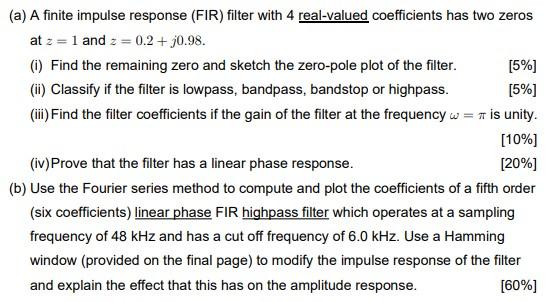Home /
Expert Answers /
Electrical Engineering /
a-a-finite-impulse-response-fir-filter-with-4-real-valued-coefficients-has-two-zeros-at-z-1-pa286
(Solved): (a) A finite impulse response (FIR) filter with 4 real-valued coefficients has two zeros at \( z=1 ...
(a) A finite impulse response (FIR) filter with 4 real-valued coefficients has two zeros at \( z=1 \) and \( z=0.2+j 0.98 \). (i) Find the remaining zero and sketch the zero-pole plot of the filter. \( [5 \%] \) (ii) Classify if the filter is lowpass, bandpass, bandstop or highpass. \( [5 \%] \) (iii) Find the filter coefficients if the gain of the filter at the frequency \( \omega=\pi \) is unity. \( [10 \%] \) (iv) Prove that the filter has a linear phase response. \( [20 \%] \) (b) Use the Fourier series method to compute and plot the coefficients of a fifth order (six coefficients) linear phase FIR highpass filter which operates at a sampling frequency of \( 48 \mathrm{kHz} \) and has a cut off frequency of \( 6.0 \mathrm{kHz} \). Use a Hamming window (provided on the final page) to modify the impulse response of the filter and explain the effect that this has on the amplitude response. \( [60 \%] \)
